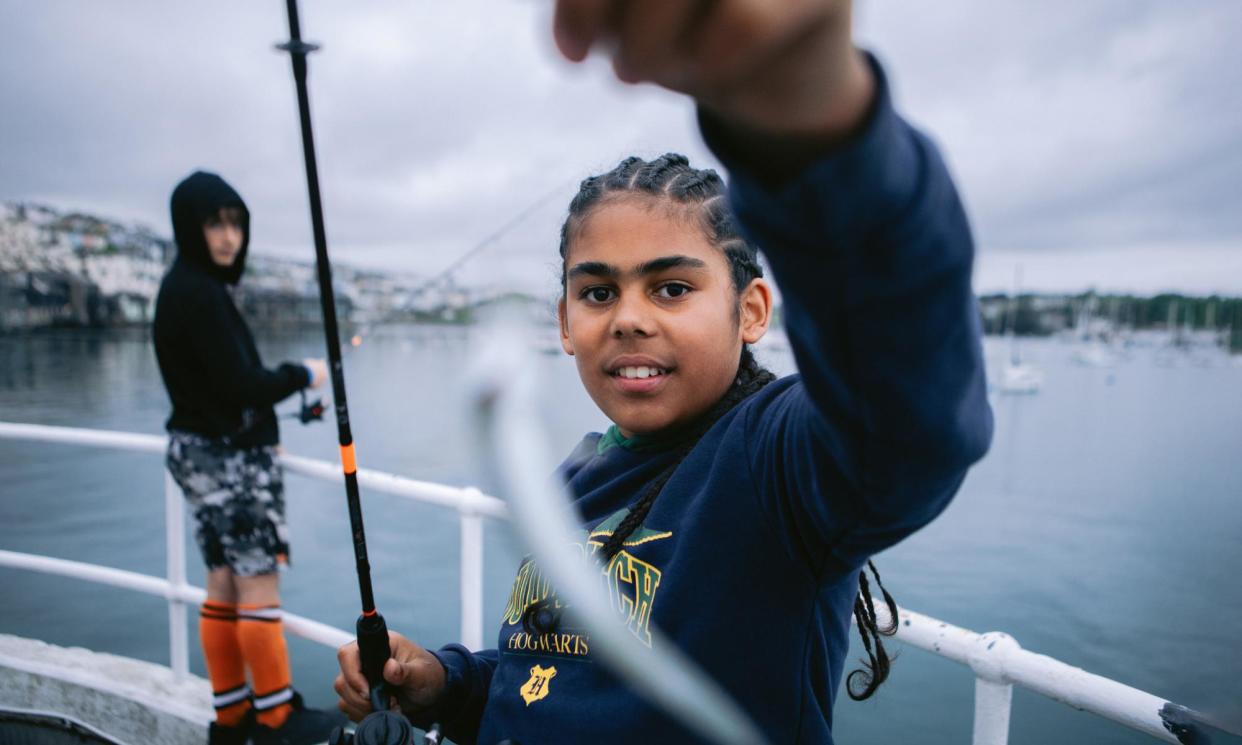‘It’s not about catching anything’: the Cornish group fishing for wellbeing

When Justin Keight saw two ambulances outside his best friend’s house one morning during the Covid lockdown, he knew instantly what it meant. His friend, who was married with children, had lived with depression.
“The day before he killed himself he told me he was really struggling,” he says. Keight urged him to stay the night and talk, but his friend did not want to break the social distancing rules.
Three years on, Keight is standing on the pier in Falmouth helping a group of strangers – many of them men struggling with their mental health or loneliness – to fish. He and his small group of trained volunteer angling coaches do this every fortnight. This time nearly 30 people of different ages have turned up.
On Falmouth pier, Andrew prepares his rod to take part in the Tight Lines fishing session
“It’s about bringing people out of that room where they feel blocked, and getting them down by the moving water, which is so good for your wellbeing,“ Keight says.
One middle-aged man is on a roll, catching fish after fish. He was put in touch with the group, which is called Tight Lines, after reaching out to another mental health charity locally. Keight helps him to release the fish gently back into the water and they watch them swim away. They are tiny sprats, but the man’s face lights up with pleasure and pride.
Others are not catching much at all, yet standing next to another person, who is also getting to grips with their fishing rod, they often start chatting.
Andrew, who is in his early 70s and lives alone in a Cornish village, has not fished since he was a young man. Alongside him is Ian, who lives in Worcester but wants to move to the county. His father had a boat and they came to Cornwall a lot, so it feels “like home”.
Some of the day’s catch. Coaches show newcomers how to gently return them to the sea
From top: Justin, a coach, with Reo, who has come with along with his grandma; Harry, another young fisher, reels in his catch; Angela prepares the bait; a black goby; Ian holds his latest catch
“Water just makes you feel better,” Ian says. “I’ve always loved it.”
Further along the pier, Tash, who has a hectic job in a care home, says: “It’s not really about catching anything. It’s just peaceful.”
It is her first time sea fishing, and the man next to her, who has brought his own kit, helps her cast her line farther into the water. Tash points out a cormorant, ducking its long black neck into the water. She knows the names of all the seabirds. “I’ll definitely be back,” she says.
‘It’s just peaceful’: Tash prepares to cast her rod
Ange, one of the angling coaches, has relied on quiet fishing trips to get her through some of the harder times in her own life, including the loss of her parents. Last week she caught some pollack and delivered them to a community kitchen in Porthleven, where she lives, which is famous among tourists for the waves that crash against its harbour wall. The kitchen fed 32 local people with breaded fish that night, and they froze the other half for fish pie.
“We fed 60 hungry people for nothing,” Ange says. “That feels good.”
At Tight Lines, Ange knows her role is as much about talking to people as it is about fishing. “Bringing them out in the air does something. It’s gentle,” she says. “It mellows people out.”
A cast line wafts in the breeze over the sea
Tim Cocks, who helped Keight set up Tight Lines, describes the experience as being “about taking your mind off your problems”.
“Maybe you haven’t had a single bite, but you’ve seen a seal or a swan, and been in the fresh air and talked,” he says. “It all lowers your blood pressure.”
Julia Berry, a local police community support officer who has been involved with the group since last year, has brought along her grandson, Reo. She is pleased to have torn him away from his computer to go fishing, but adds that she also wants him to have more positive male role models in his life.
Reo poses with his catch, a black gobey fish, as his grandmother, Julia, takes a photo and Angela, the coach, ensures the fish is safely unhooked to throw back
She believes groups such as Tight Lines are especially valuable for men. “Women go out and chat. Most men don’t,” she says. “Here, you’re just standing fishing, but then gradually you get to talk to people, with no pressure.”
As the night draws in, people start to pack up and head home. Many check when the next occasion to meet up will take place. Keight says he is pleased with the turnout.
“When I started this I thought if I help just one man a year, then I’ll have really done something,” he says. “I think this could have really helped my best friend.”
One fisher is still casting as it begins to grow dark
In the UK and Ireland, Samaritans can be contacted on freephone 116 123, or email jo@samaritans.org or jo@samaritans.ie. In the US, you can call or text the National Suicide Prevention Lifeline on 988, chat on 988lifeline.org, or text HOME to 741741 to connect with a crisis counselor. In Australia, the crisis support service Lifeline is 13 11 14. Other international helplines can be found at befrienders.org


